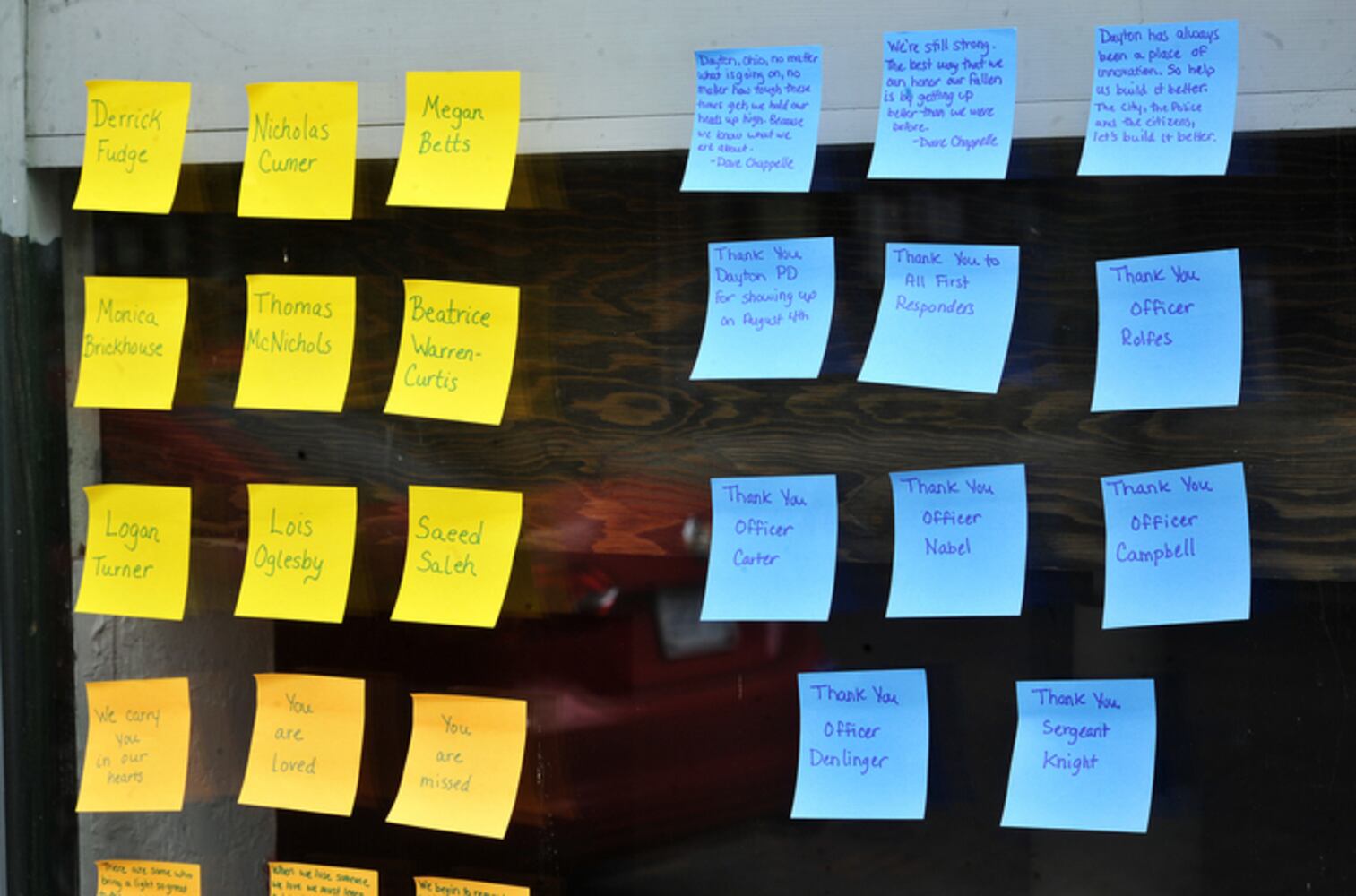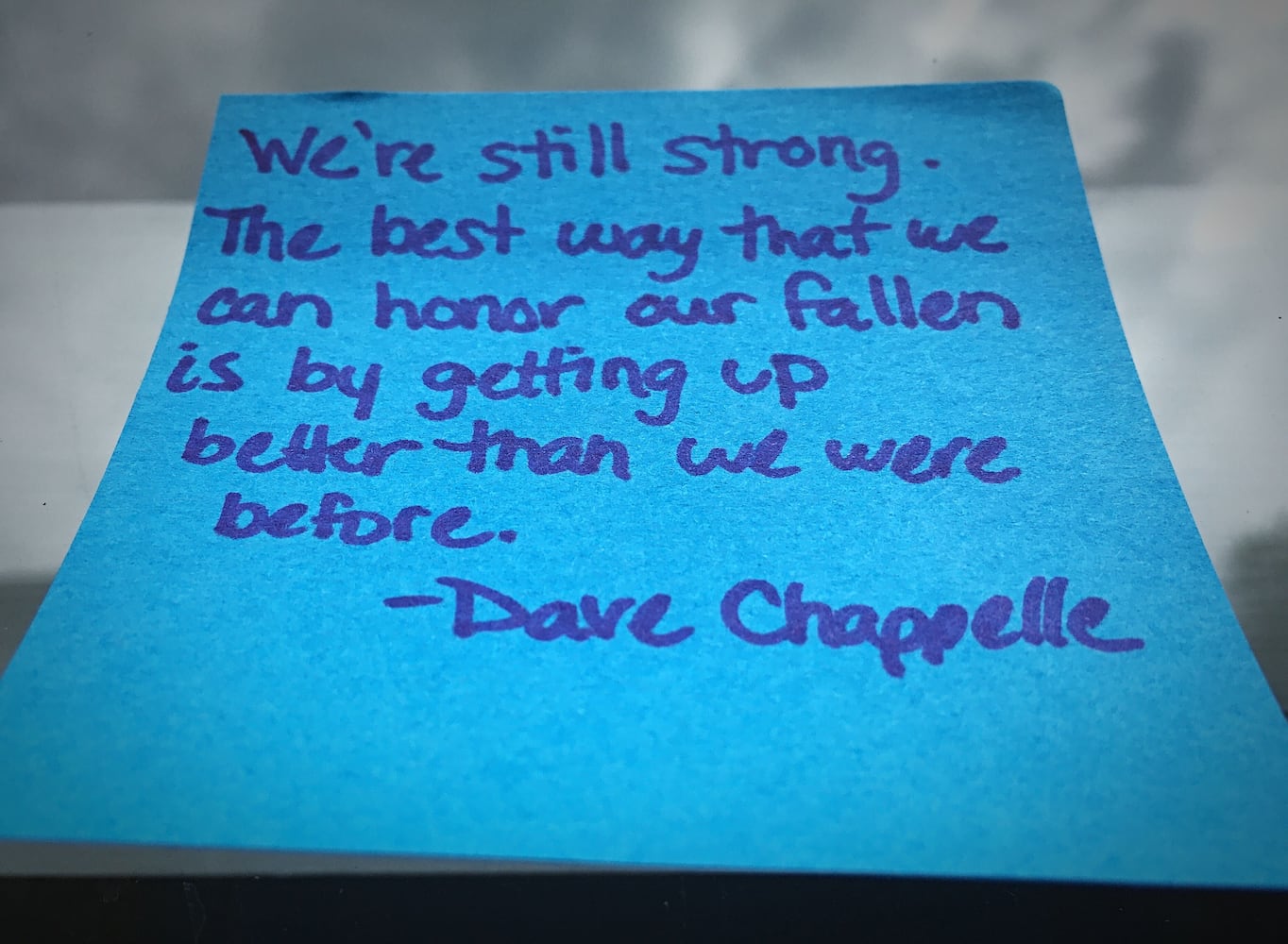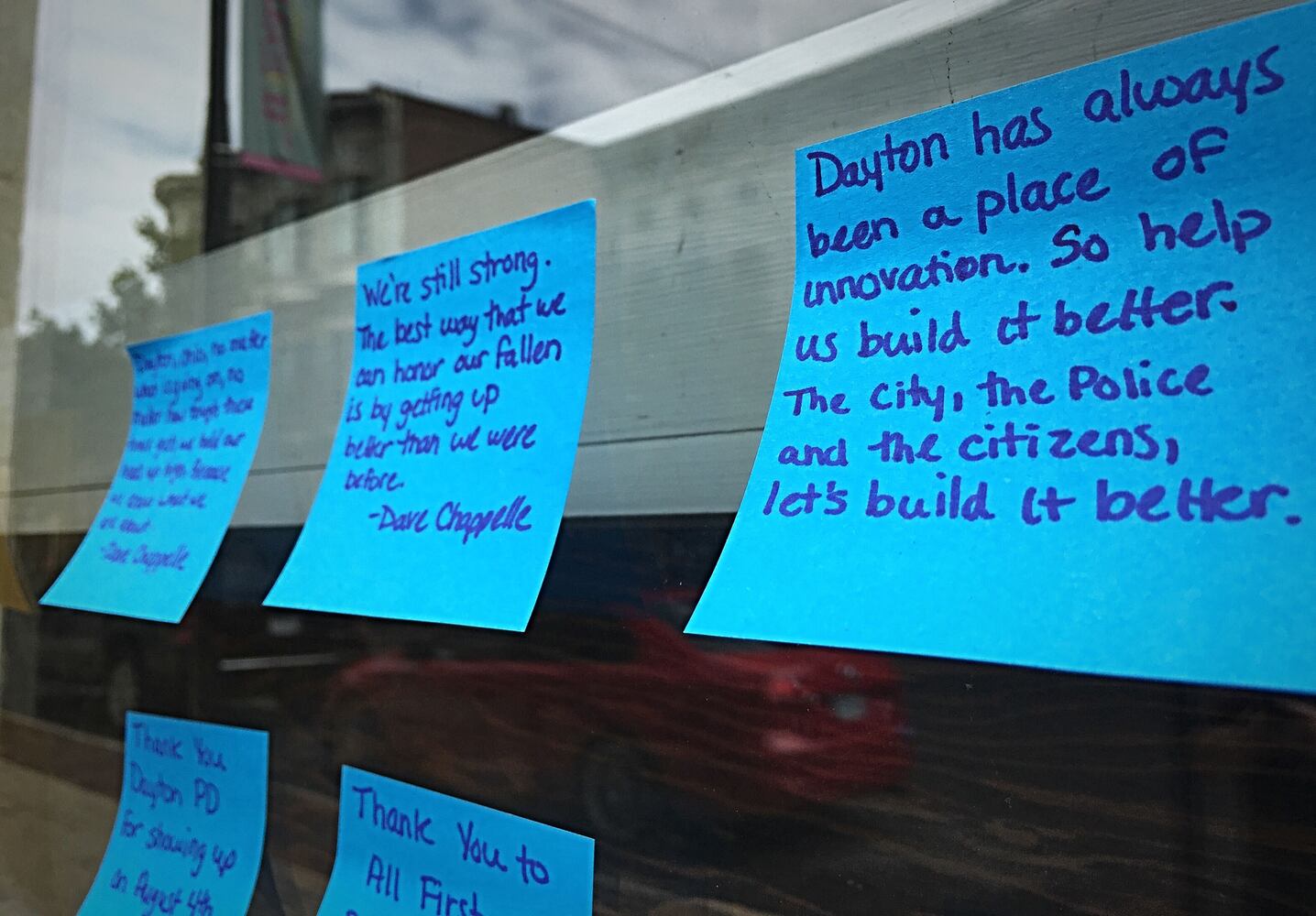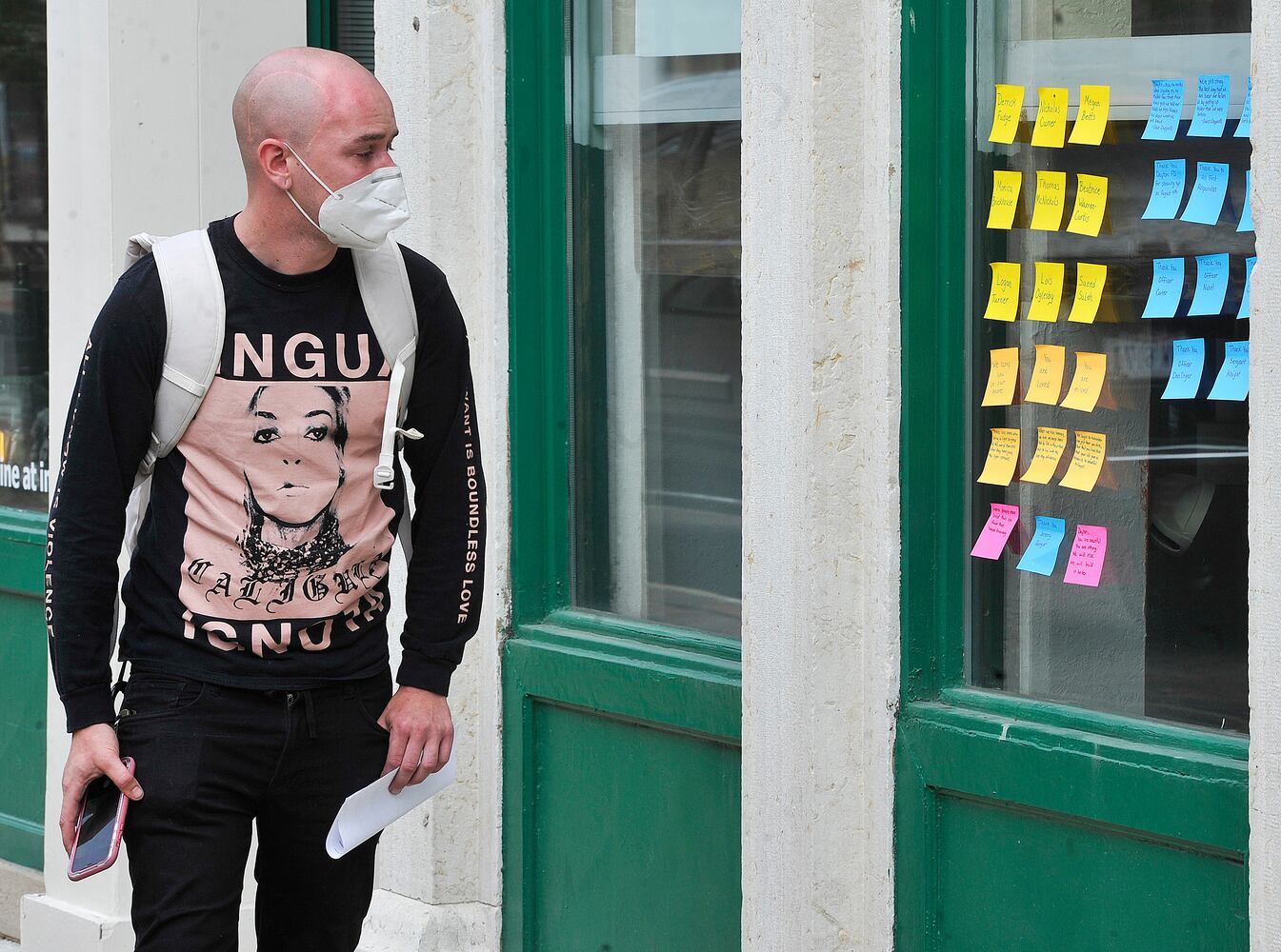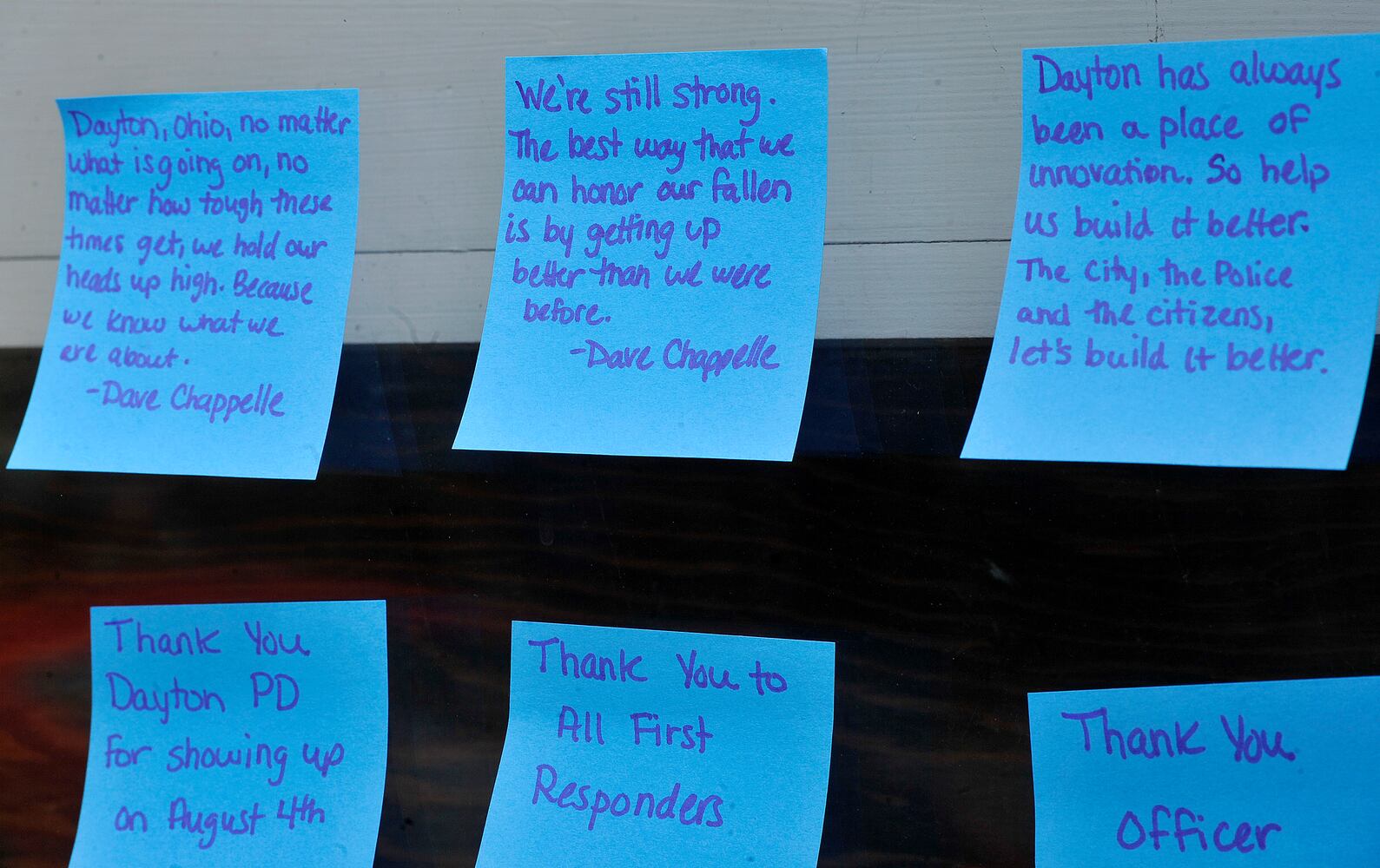Much has happened since the Oregon District tragedy one year ago today, including a once-in-a-century pandemic, political turmoil, a deep economic crisis, and widespread protests against racism and police misconduct.
Some people believe divisions have increased or intensified in our community. A Dayton Daily News online poll found that most respondents believe the community is less united now than it was last year after the mass shooting.
Credit: DaytonDailyNews
But many people — including a wide variety of Oregon District business owners, employees and visitors — said the Dayton region is just as strong and united as before. Community members put aside their differences after the shooting to help each other out, and they said that goodwill has not gone away as people find new ways to connect.
“The community is united,” said Kyle Babirad, president of the Oregon District Business Association. “The pandemic has required many to redirect their energies, but the spirit is still here.”
Love after hate
On Aug. 4, 2019, Connor Betts murdered nine people and wounded many others in the span of about 30 seconds, before he was shot and killed by Dayton police.
The shooting spree left many people with serious injuries and emotional scars. The community felt intense grief and incredible pain.
But the kind acts began almost immediately.
Complete strangers hugged and comforted each other at vigils and memorial events.
People regularly checked in with friends, neighbors, co-workers, acquaintances and strangers to make sure they had the help they needed. They offered shoulders to cry on, and safe and supportive spaces to talk about their feelings.
People volunteered, donated blood and put on events like bake sales and bar crawls to benefit victims,, their families, survivors and the district.
The Dayton Oregon District Tragedy Fund received more than 5,200 gifts, which likely includes donations from thousands of people who opened their wallets at hundreds of fundraisers and events. The fund received nearly $4 million in contributions that was distributed to survivors and victims’ families.
People also created art to honor and celebrate the lives lost.
Anonymous individuals put sticky notes with uplifting messages of appreciation and love on the windows and doors of Oregon District businesses and buildings.
Community pride felt like it might be at an all-time high. Dayton Strong shirts flew off the racks, and many people got Dayton-themed tattoos.
Residents and businesses across the city hung “Thank you Dayton Police” signs and banners.
Then vs. now
Some people think the mood has changed and feelings of togetherness have faded.
Nearly two-thirds of respondents to an online Dayton Daily News poll said the community is less united than it was after the tragedy.
Some of the more than 200 poll-takers said right now tensions are high, politics are ugly and COIVD-19, protests for racial justice and the recession have exposed major rifts.
Christy Jennewein, who works at Jay’s Seafood in the Oregon District, said that the community has had a tough year but she wishes people would be more united and try to see other people’s point of view.
“It’s very divisive right now,” she said. “You can’t really get on social media without being polarized.”
There is a sense of isolation right now because the pandemic limits people’s interactions, said Blind Bob’s manager Andy Rowe.
Rowe said he believes the community is still united and supportive, but online exchanges are not as warm and understanding as face-to-face encounters.
“When you read social media comments for any news provider online, the tone is so astoundingly different than it is when we gather in person,” he said. “So I wish we could do better about treating each other online like we do when we see everyone like at a fish fry or at a concert or all the things we used to do.”
Oregon still feels the love
From the Oregon District perspective, strong community pride and unity still exists, but right now it’s somewhat muted because everyone is so focused on keeping their businesses alive and their staff healthy, said Natalie Skilliter, owner of Corner Kitchen, an Oregon District restaurant that recently closed for financial reasons.
But she believes the pandemic, the state of the economy and the diverse crowds at protests against racial injustice in more than 25 communities across the local region are unifying people, not causing division.
Also, they say, community members have much in common right now, including shared struggles and mutual anxieties, because everyone is dealing with the most serious public health crisis in generations.
“We all share this fear, knowing that we are not alone; we root for each other, believing each individual success is a victory for the entire community,” Skilliter said. “We share values and hopes for greater justice and security, striving for a community that need not be fearful of itself.”
Community members might live and work in different areas and choose different places to shop, drink and eat. But a large segment of the population has at least some connection to the Oregon District, and many visit it at least occasionally.
Though the district is the center of downtown’s night life, it is not very large. Many residents know someone directly impacted by the mass shooting, making the tragedy personal.
The district has always been tight-knit, and the tragedy seemed to strengthen those bonds and feelings of connection to the area, some said.
“In the past year, we have grown so close as a community,” said Tailor Curtis, social media manager for Heart Mercantile.
Shane Juhl, founder of Toxic Brew Company in the Oregon District, said Dayton residents are more loyal and loving toward their city than anywhere else he’s ever lived.
Despite some recent polarization over masks, the community is still very much “Dayton strong,” Juhl said, which is evident in how people came together to protest for racial justice and support businesses during the state’s stay-at-home orders.
“To me (Dayton Strong) means not only are we strong and resilient, but we’re united, and we move together. We act together,” he said. “And we have to come and then meet in the middle instead of being polarized.”
What strength means
Many people told this newspaper that one thing that makes Dayton great is its exceptional generosity.
Giving is a part of the Dayton region’s DNA, and the community has shown its resilience and compassion repeatedly when people stand together in times of tragedy, said Michael Parks, president of the Dayton Foundation.
The community dug deep to raise money for tornado relief and then the Oregon District tragedy, and more recently, for the COVID-19 Response Fund for Greater Dayton, Parks said.
People in this community care deeply about their neighbors and want to help them out when they are in need, Parks said. The COVID-19 fund has received more than $1.8 million in gifts.
The Dayton community also is used to adversity and crises.
Notable hard knocks include the closure of the GM plant, NCR’s departure, the opioid crisis and the 2019 KKK-affiliated hate group rally downtown and last year’s tornadoes on Memorial Day.
Some people credit Dayton’s grit to the hardships it has had to overcome.
“Dayton is a tough small town,” said Dayton resident Willie Peavy.
The emotional fervor following a tragedy like the Oregon District shooting doesn’t last, but the deep community ties and relationships developed in the aftermath of a crisis can be maintained, said Robin White, executive director of research with the Global Resilience Institute at Northeastern University.
Community resilience is the ability to withstand disruption, she said, and places like Dayton can recover from destabilizing events if they have the right assets and resources, people who step up and show leadership when it matters, and a vision for what it will take to overcome and move past the crisis.
“Community resilience is a journey — it is not a destination,” White said. “You don’t just do 10 things, and now you’re resilient. It’s a constant process that a community must work through.”
People can disagree and still feel connected to each other.
Jason Harrison, co-owner of Present Tense Fitness who lives and works in the Oregon District, said the sense of unity after last year’s tragedy was palpable.
Harrison said he couldn’t walk down Fifth Street without getting lots of hugs from people. People were often moved to tears.
Despite the sense of shared grief, Harrison said that crises like the shooting shouldn’t obscure the fact that the community still has real problems, including with race and segregation, that demand attention and action.
For Harrison, the city truly will be Dayton Strong when everyone views building an equal city and region as part of their responsibility.
“I would encourage anybody who cares enough to to buy a Dayton Strong T-shirt or put a Dayton Strong sign in their window or a Black Lives Matter sign in their window to then take the next step,” he said. “Hold public officials accountable. Ask uncomfortable questions.”
“To me, it’s not mutually exclusive to have love for a city and to be a deep critic of the city,” he said.
